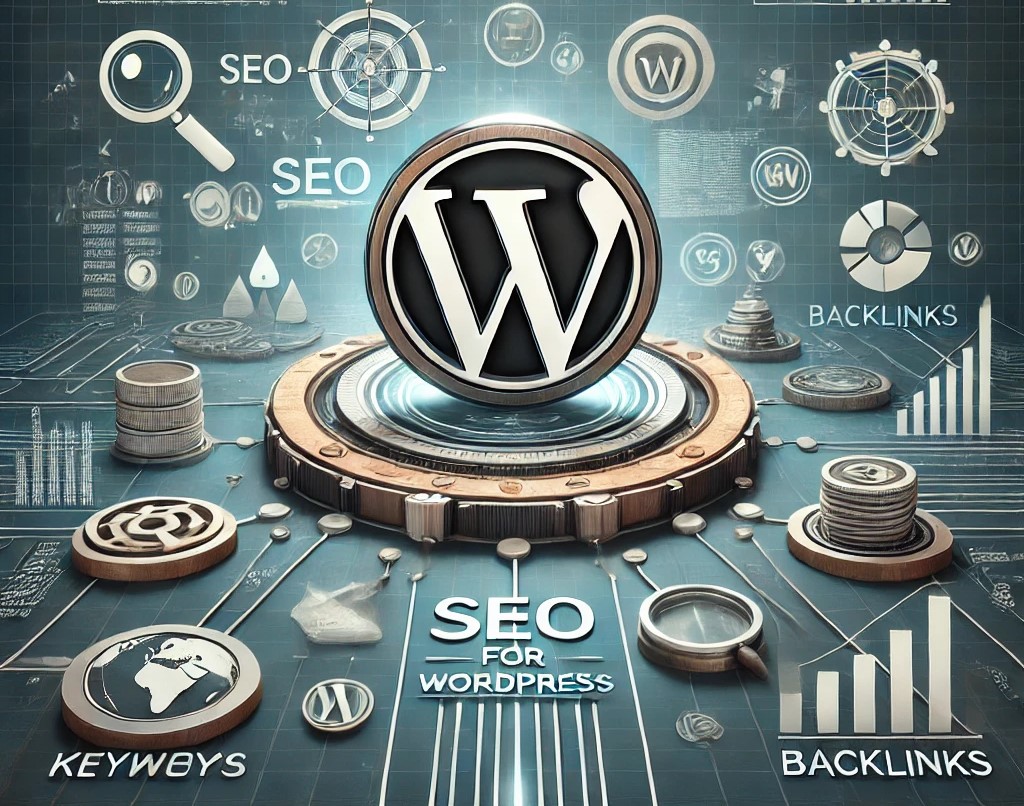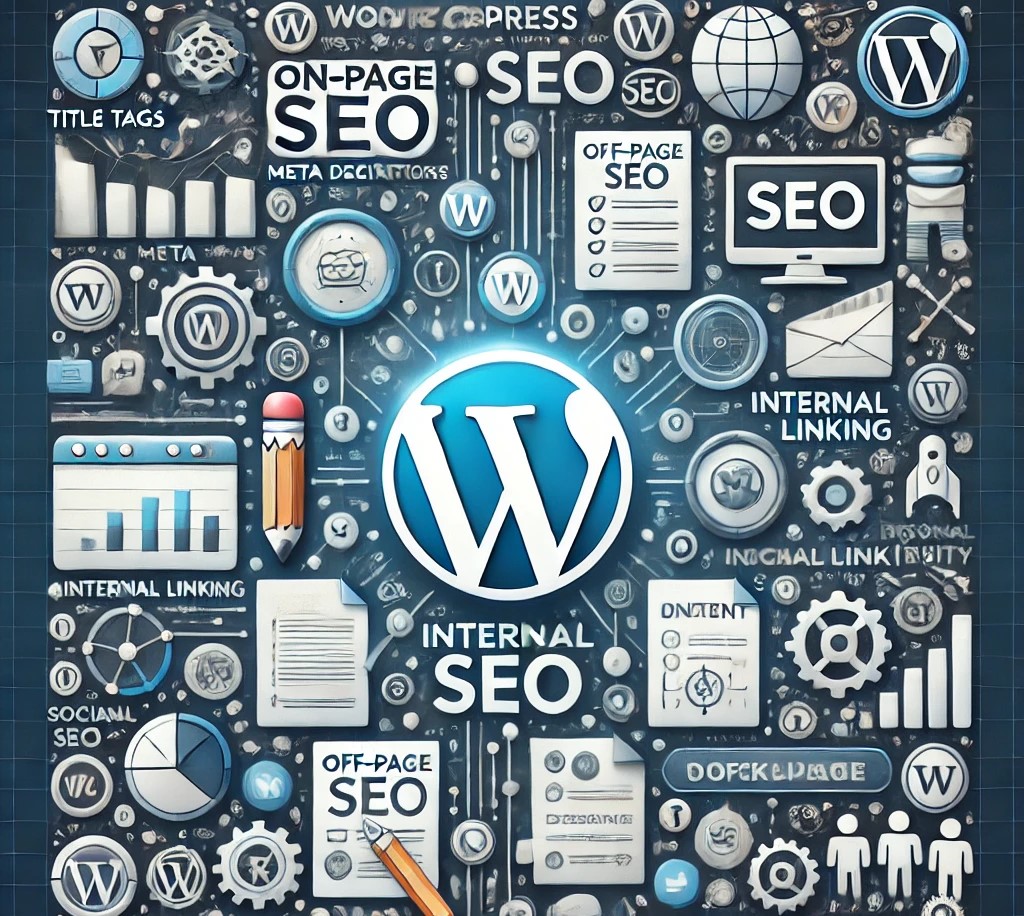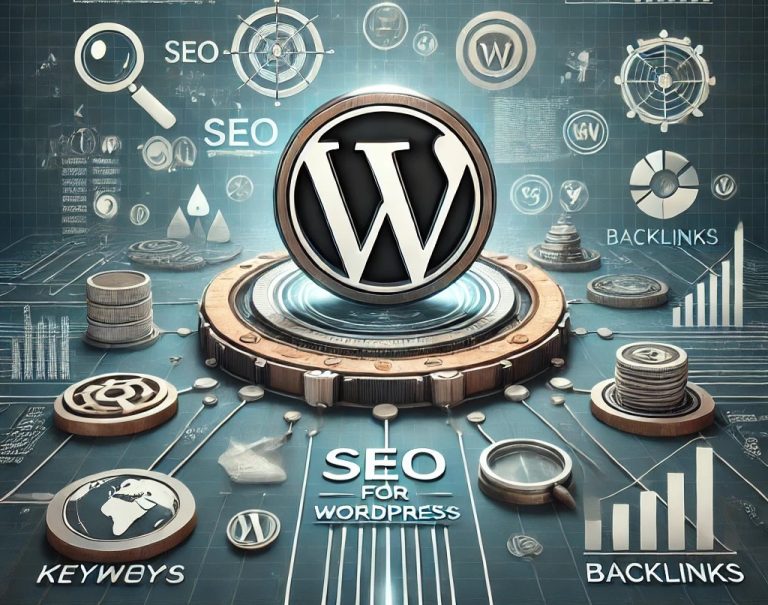We are emphasizing the significance of SEO for WordPress and offer 15 actionable tips on boosting search engine rankings by optimizing your WordPress website. SEO is vital for driving traffic and improving visibility for a WordPress website. Our article will encompass various elements that impact a site’s SEO performance, with some being within control while others are not. The elements include content optimization, keyword utilization, meta tags, page load speed, mobile responsiveness, and more.
SEO For WordPress

Why is SEO Important for WordPress?
SEO is important for WordPress websites as it directly correlates to search engine rankings, boosts Google visibility, increases organic traffic and user engagement, and leads to higher conversions.
Implementing SEO strategies on a WordPress site impacts search engine rankings and contributes to optimizing the overall user experience.
Our experience shows that by prioritizing the creation of high-quality content, improving the site’s navigation, and providing swift loading times, website owners guarantee that their visitors enjoy a seamless and gratifying browsing experience.
Google’s algorithm specifically values user experience when determining a website’s ranking, so improving user experience leads to improved search engine rankings.
Consequently, the more optimized a WordPress website is, the greater its chances of ranking well in search results and attracting organic traffic.

What are the Key Factors for SEO in WordPress?
The key aspects of perfect SEO for WordPress include on-page SEO, off-page SEO, technical SEO, and specialized plugins designed to improve search engine optimization.
1. Content Optimization
Optimizing content is an integral aspect of SEO in WordPress, utilizing keywords, meta tags, and quality content best practices for better search engine rankings.
Keyword density is a necessity in content optimization, indicating how often a keyword appears in an article to the total content. Maintaining the right keyword frequency is vital, as excessive keyword usage leads to penalties from search engines.
Incorporating meta tags such as meta descriptions and meta titles is another effective method to improve search visibility for your WordPress site in search engine result pages.
Developing engaging and relevant content for your target audience improves SEO and encourages user interaction and sharing on various platforms, thereby increasing overall site visibility.
2. Keyword Research
Keyword research in WordPress is a required SEO process where website owners identify the most important relevant keywords and long-tail keywords that match what users are searching for. The research is typically conducted using tools such as SEMrush, Moz, and Ahrefs, which provide valuable insights into search volume, keyword difficulty, and potential opportunities for targeting specific keywords.
The tools also offer data on keyword trends, related keywords, and backlinks to top-ranking pages.
Understanding search intent is fundamental for website owners and content creators, as it allows them to develop content that aligns with what users are looking for. Search intent refers to the purpose behind a user’s search query, is to be informational, transactional, or navigational.
3. Site Speed and Performance
Site speed and performance are vital technical SEO factors for WordPress sites, as fast-loading pages are preferred by Google and improve user experience.
Optimizing images is a key strategy to improve site speed, as large image files often lead to slow loading times. Compressing images without compromising quality and utilizing lazy load techniques develop the overall site performance.
Leveraging browser caching allows users to access previously stored resources more efficiently, thereby reducing loading time for returning visitors. Implementing performance-inducing plugins, such as caching plugins and minification tools, further optimize a WordPress site’s performance and speed, ultimately boosting its SEO and search engine rankings.
4. Mobile Responsiveness
In WordPress, mobile responsiveness is a trendy necessity for SEO as it guarantees the website is fully optimized for mobile devices.
A mobile-responsive website automatically adjusts its content to the screen size being used, providing a consistent and positive user experience across different browsers and devices. Structuring content with H1 and H2 headings improves SEO search rankings.
Responsive design and themes incorporate flexible grids and images that adjust in size to fit the screen resolution, promoting readability and user experience.
5. On-page SEO
On-page SEO requires the optimization of the individual pages of a WordPress site with elements such as title tags, meta descriptions, H1 tags, and content to improve search engine visibility and user engagement.
Title tags are vital in keyword optimization, as they convey to search engines the essence of the page. Meta descriptions, on the other hand, provide a summary preview of the page’s content beneath the title in search results, enticing users to click through. H1 tags serve as the main headings of the page, aiding search engines in comprehending the page’s structure.
Additionally, internal linking facilitates search engine navigation across the website, establishing a hierarchy and distributing link equity throughout the site.
6. Backlinks and Link Building
Backlinks and link-building are an indispensable part of any SEO, especially for WordPress. The results are improved site authority and search engine rankings through external linking.
Acquiring quality backlinks is achieved through methods such as guest blogging, where providing informative and relevant contributions to other websites in your niche establishes your site’s expertise and secures valuable backlinks.
Directory listings are also effective in improving your site’s SEO by providing authoritative sources linking back to your WordPress site. Additionally, creating shareable content such as infographics, videos, or guides increases the likelihood of obtaining backlinks from reputable websites, ultimately improving the authority of your site in the online domain.
7. Social Media Integration
Integrating social media with your WordPress website is required for SEO, engagement, and content marketing strategies aimed at building and boosting organic traffic. A robust social media presence allows you to share your content across multiple platforms, reaching a wider audience, improving brand recognition, and driving more traffic to your site.
Social signals, such as likes, shares, and comments, boost search engine rankings, underscoring the significance of a strong social media presence.
Pro tip: by incorporating social sharing buttons through plugins, you simplify the process of encouraging visitors to share your content on their preferred social media platforms, thereby increasing online visibility and user engagement.

How to Optimize Your WordPress Site for SEO?
To optimize a WordPress site for SEO, one must:
- Choose the right plugins
- Conduct regular site audits
- Improve the overall site structure for better user experience and boost search engine positions
1. Choose a SEO-friendly Theme
The first and most logical step in optimizing a WordPress website is selecting an SEO-friendly theme. Websites that utilize well-optimized themes are responsive, load quickly, and provide an improved user experience. An optimized theme boosts a website’s visibility on search engines.
An SEO-friendly theme features clean, structured code that allows search engine crawlers to easily search through the design and content. When picking a theme, it is basic to opt for one that allows customization and branding while maintaining performance.
2. Use SEO Plugins
SEO plugins such as Yoast SEO and Rank Math automate the complex process of optimizing a WordPress website and provide tools for improving meta tags, creating sitemaps, and analyzing content. The plugins include features for keyword optimization, suggesting internal links, and analyzing readability.
Yoast SEO optimizes individual pages and posts with real-time content analysis, while Rank Math offers advanced schema markup options to improve search engine visibility.
We highly recommend: that by improving a website’s overall SEO performance, the plugins increase its chances of ranking well in search engine results. Customizing them to meet the specific needs of a site, such as configuring XML sitemaps and optimizing meta descriptions, further boosts the SEO performance of a WordPress site.
3. Optimize Your Content
Implement Content SEO in WordPress by creating valuable search-engine-optimized content with the objective of fulfilling user intent and search engine ranking criteria. It is achieved by conducting keyword research to pinpoint relevant, high-traffic keywords that are seamlessly incorporated into your content. Utilizing long-tail and semantic keywords will assist you in reaching a more targeted audience.
Organizing content with headings, bullet points, and compelling multimedia elements encourages visitors to spend more time on your website, thereby boosting your site’s SEO ranking.
4. Utilize Keywords
Keyword use refers to the strategic placement and density of target and long-tail keywords in your content, which is a fundamental aspect of WordPress SEO. Conducting keyword research is vital to identify the most important and effective keywords for your website.
While some keywords may be obvious, research allows you to discover popular search terms relevant to your content. Maintaining an optimal keyword density is important to communicate to search engines the primary focus of your page.
5. Optimize Images
Image optimization encompasses various practices that collectively improve website performance. One key strategy is to decrease image file sizes without compromising quality, achieved through compression tools or resizing images to fit the required dimensions for the website.
Including descriptive alt text improves user experience and aids search engines in comprehending the image content.
Utilizing plugins designed for image optimization automates the process, simplifying the upkeep of an optimized image library without requiring manual intervention.
6. Improve Site Speed and Performance
One highly effective technique for improving site speed is the optimization of images by resizing them to appropriate dimensions and compressing them without sacrificing quality. The practice greatly reduces page load times.
Another strategy is to minify CSS and JavaScript files by eliminating unnecessary spaces, comments, and non-essential characters, thereby streamlining the website’s code for quicker load times. Utilizing caching plugins, which create temporary page copies, decrease server response time, and improve overall performance.
7. Build Quality Backlinks
Three effective methods for creating high-quality backlinks are as follows:
- Guest blogging on relevant and authoritative websites within your industry is one of the most impactful ways to build quality backlinks. Provide valuable content to the platforms to showcase your expertise and acquire backlinks to your WordPress site.
- Creating shareable content that naturally attracts backlinks. Content formats such as infographics, how-to guides, and in-depth articles tend to draw backlinks from other site owners naturally.
- Engaging in industry forums. Actively participating in discussions and offering valuable insights establishes credibility and earns links back to your WordPress site.
The steps we have mentioned sound pretty straightforward, but the devil is in the details. Unless you want your website to have low traffic, we recommend finding an SEO expert for consultation and teaching. Your expert is your guardian angel; they will guide and teach you what is right in the SEO world; that way, you can do no wrong and still have fun doing it.
The button will redirect you to the Upwork freelance platform, where you can schedule 30-minute consultations for $30 or 1-hour consultations for $60.

Frequently Asked Questions
What is SEO for WordPress?
SEO for WordPress means optimizing a WordPress website to improve its visibility on search engines, improve user experience, and drive organic traffic. The elements include keyword usage, content optimization, and improving site speed.
Why is SEO important for my WordPress site?
SEO is important for increasing your site’s visibility in search engine results, which leads to higher traffic and more conversions. A well-optimized site also improves user experience, which is a key factor in ranking higher on search engines.
What are the most important factors for SEO on WordPress?
Key factors include content optimization, keyword research, site speed and performance, mobile responsiveness, on-page SEO, backlinks, and social media integration. Each of the elements plays a role in improving your site’s search engine ranking.
How Do I improve the SEO of my WordPress site?
You improve your WordPress SEO by optimizing your content with relevant keywords, using SEO plugins, improving site speed and mobile responsiveness, and building quality backlinks.
What tools should I use to optimize SEO on WordPress?
SEO plugins such as Yoast SEO and Rank Math are tools that provide insightful features such as keyword analysis, meta-tag optimization, and sitemap generation to improve your site’s SEO.
What role do backlinks play in WordPress SEO?
Backlinks from authoritative and relevant sites improve your website’s domain authority and search engine rankings. Engaging in guest blogging and creating valuable, shareable content will aid you in acquiring quality backlinks.
How does mobile responsiveness affect SEO?
A mobile-responsive WordPress site provides a consistent user experience across all devices, which is an important factor in improving search engine rankings. Google prioritizes mobile-friendly sites, making it important for SEO.

